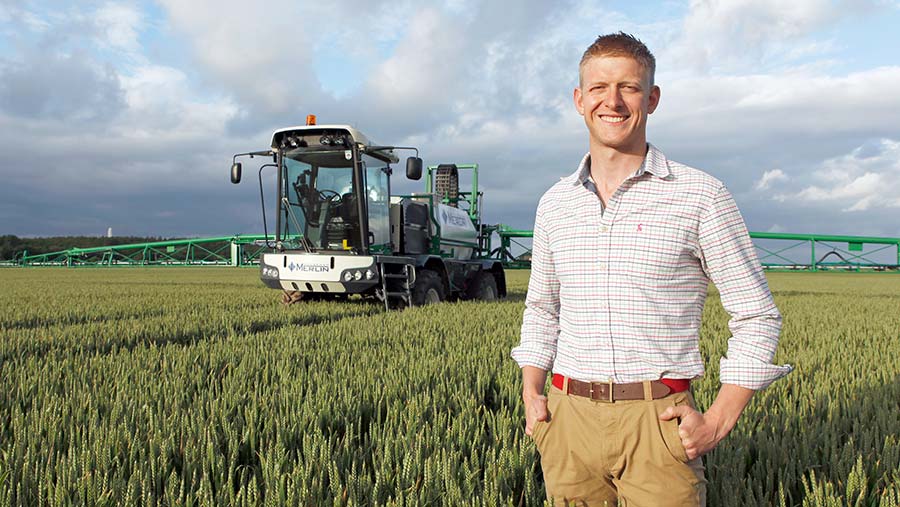Job profile: What’s it like to be a farm manager?
Farm managers are responsible for the day-to-day running of a farm on behalf of a landowner, while making sure that the business is both profitable and sustainable over the longer term.
It’s a role that requires good practical knowledge, along with strong management and leadership qualities.
Responsibilities are likely to include budgeting, buying, selling, record-keeping, staff management and investment strategies.
Robert Yardley, 33, explains what his job involves and how he has got there:
See also: See more job profiles and ag careers advice

Robert Yardley, 33, farm manager
Explain your role
I’m a farm manager looking after 1,050ha of cropping on an arable farm near Selby in West Yorkshire for Velcourt.
I manage two full-time members of staff and there are five at harvest time.
This is my third year in the role, which involves everything to do with the day-to-day running of the business, such as planning and managing the cropping, record-keeping, staffing and machinery purchases.
My goal is to make sure this is a sustainable and profitable business.
Was farm management always your goal?
Farming wasn’t my first career choice, even though my dad was a dairy herd manager.
Between the ages of 17 and 21, I spent time both in the armed forces and training as a chef.
But at 21 I realised I wanted to go back to my roots in agriculture, so got a job on a farm in Buckinghamshire and it confirmed to me that it was the right path.
So I started thinking about how best I could get the right experience to fast-track my career.
How did you make the step from farmworker to manager?
I spent a couple of years working on farms in Australia and New Zealand to gain more experience, returned to the UK to work as part of a contracting team in Lancashire, set up my own straw haulage business and then moved to work on an arable farm.
At that point, at the age of 27, I decided to go to university, so I signed up for a four-year part-time course at Reaseheath, which led to a Foundation degree in Science and Agriculture.
I also made sure I grabbed opportunities that came my way, including attending the Oxford Farming Conference as a scholar.
This got me noticed by Velcourt and I joined its trainee scheme in 2016.
What do you enjoy most about your job?
The reality is, with land prices where they are, I’m never going to be able to own my own farm.
But it’s a privilege to have responsibility for a farm and be able to implement a vision.
In my current role, I’ve been working to reduce our horsepower requirements, implemented new cultivation techniques, changed the rotation and introduced sheep to the farm to help with soil management.
It’s exciting to see our plans coming to fruition.
How much of your time is spent in the office and how much outside?
I try to make it 50:50. It would be tempting to sit in the office more than this in the winter, but I make myself get out because it’s a good time to do jobs like walking the watercourses to check that the drains are flowing.
What can be the downsides?
The commitment required means the hours can be long and this can make sustaining relationships a challenge. Digging out drains in the middle of winter can be tough, but there’s a satisfaction when the job is done.
What skills and experience are essential for your kind of role?
I really value the range of practical experience I have, which means that I’m never asking anyone to do something that I can’t do myself.
But as a farm manager I also need to be able to develop a vision for the business and to build a business case for my decision-making.
You’ve got to be able to make decisions – although they won’t all be right.
Being open to change is also important – I probably moved house five times in the first year as I moved around different estates (although this is very unusual).
What tips or advice would you give to someone wanting a similar role?
Get plenty of practical experience, as it gives you confidence.
I’d also say explore opportunities for learning and self-development.
One of the aspects I have come to appreciate most about working for a large business like Velcourt is that you are part of a team, and so there’s always someone to bounce ideas off, or just talk to, so you never feel alone.
The trainee programme also means I have benefited from a formal structure to my career development.
I also enjoy being set targets and the reporting element of my job – it keeps me focused and sharp.
Give us an idea of salaries in the sector?
Velcourt pays a starting salary for trainee managers of between £27,000 and £30,000, with accommodation and a comprehensive training package provided.
Velcourt: vital statistics
- 99 UK farms managed, including 23 dairy units
- Total land managed covers 56,500ha
- 174 tractors, mostly hired
- Annual expenditure on inputs is £27m
